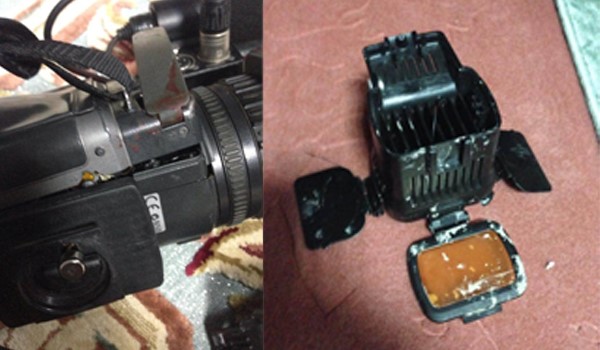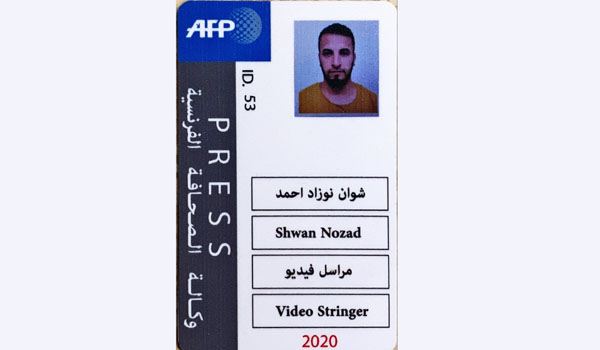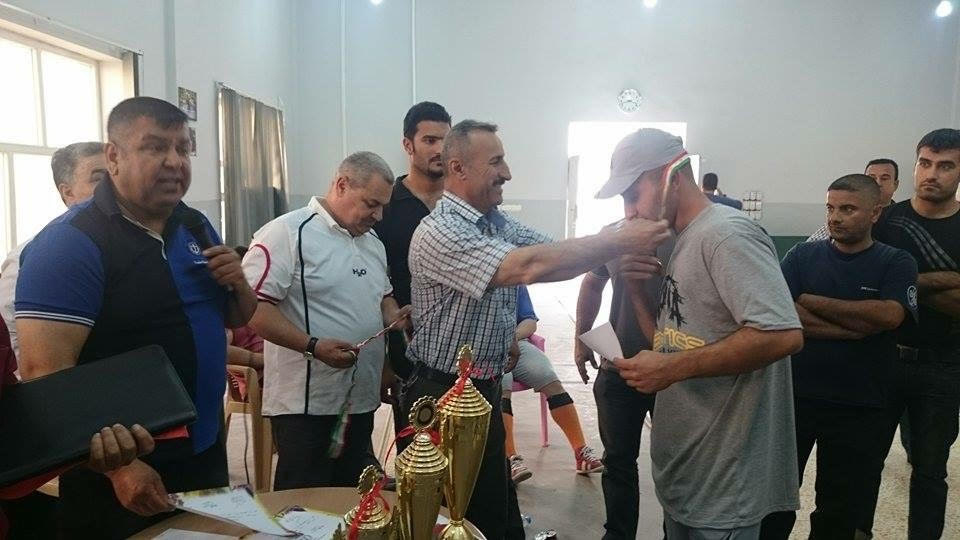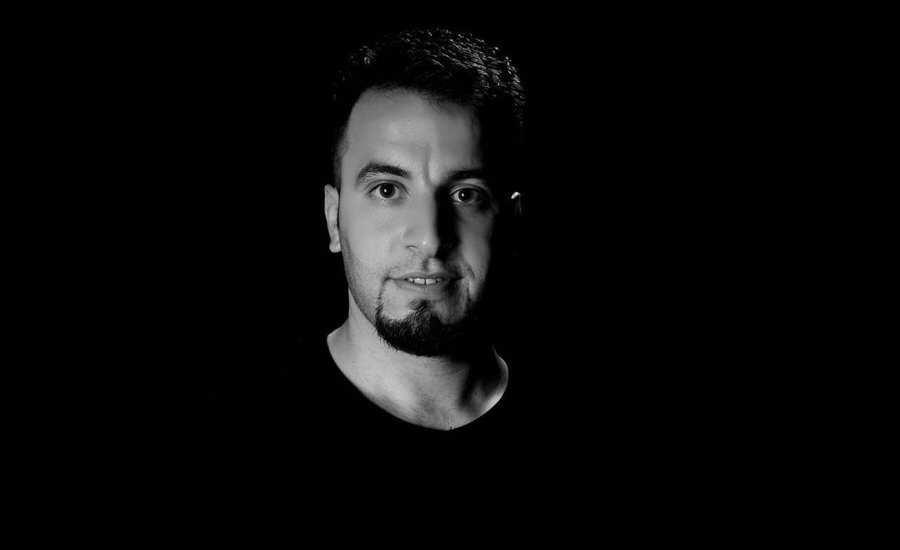Journalists are often blamed for not filing a legal complaint when their rights are violated. I did and found out who the culprit was, but the authorities and police did nothing.
My name is Shwan Nawzad. I am one of those journalists whose rights have been violated. I tried hard to help bring the culprit to justice, but my attempts were fruitless.
Let me tell you about what happened to me from the beginning:
Nearly six years ago, on 4 December 2014, I was doing my workout at a bodybuilding sport club in Kirkuk’s Shorija neighbourhood. Next to my journalism occupation, my hobby was bodybuilding and I was training to participate in Iraq’s nationwide competition.
At 7:45 pm I heard a loud noise, which caused a panic in the sport hall. As I looked out from a window, I saw smoke billowing at a distance of about 500 metres. Later it became clear to me that it was coming from an exploded car bomb.
I have been a media worker since 2009, and for a few years now I am a video reporter for Agence France-Presse (AFP). I have gathered substantial experience in the sort of incidents which I am going to talk about, and have come to know the news value of such incidents and how to get on location quickly.
Whether it’s day or night, I always have my video camera in my car.
After seeing the smoke, I quickly put on my regular clothes, hurried to my car to take out my camera and went to the location where smoke was rising from.
Since I was so close to the location, I was the first reporter to arrive there.

I started filming from different angles to capture as much as I can of what was happening.
I busy doing my work as someone in civilian clothing shouted at me loudly, asking what my business was being there. I explained to him that I was a reporter. He asked for my ID card. When I showed him my ID card, he went away and I resumed filming.
If one works as a journalist in a town for a long period, usually they easily become known to people working in security. But that does not apply to Kirkuk.
If one works as a journalist in a town for a long period, usually they easily become known to people working in security.
But that does not apply to Kirkuk, because inside Kirkuk there were 19 security different apparatuses. The most visible among the Kurdish ones were: KDP’s Parastin and PUK’s Zanyari intelligence apparatuses; two separate anti-terror bodies belonging to PUK and KDP; Emergency and Defence Police; 1st and 2nd Brigades of Peshmerga Forces. And the most visible of those under Baghdad government control were: Kirkuk Police; Iraqi Intelligence; Emergency Police; Counter-Terrorism; guard police for oil and gas facilities.
I managed to continue filming, but suddenly another person in security personnel uniform appeared before me and immediately grasped my camera and said: “Who told you can film? Who are you filming for?”
I gave him my name and credentials, but he didn’t listen and kept trying to take the camera from my hands. When he realized I wouldn’t let go of my camera, he shouted: “Come over here! This [person] is filming for the terrorists!”
Then eight individuals in civilian clothing surrounded me, grabbed me by my neck and limbs, and started beating me hard. But because I work out and therefor have strong arms, they were unable to get the camera loose from my hands. And again, when they realized that I wouldn’t let go, the one who called the others to attack me, started kicking my camera and broke it. He also broke one of my fingers and I got a nosebleed from the beating.
I find it odd that my thoughts were somewhere else while they were pounding me; I was thinking whether I would get out of this situation and would be able to win the Iraqi bodybuilding championship.
My thoughts were still on the championship when they were done beating me, and I was brought back to reality the moment I sensed two of them in civilian clothing were trying to drag me away and take me captive. Where to, I had no idea. Then I suddenly heard a voice calling: “Get back, I know that person.” Then they left me be.

Shwan Nawzad’s AFP press pass
The person who made them stop was working for also a member of the security apparatus. He was working out at the same place I was, and we knew each other. When he had seen me getting beaten, he rushed to the rescue.
When I saw that Shwan was being attacked, I knew my colleagues had misunderstood him and must’ve thought he was working with the armed groups
His name is Muhammad Ali. On the events of that night he said: “When I saw that Shwan was being attacked, I knew my colleagues had misunderstood him and must’ve thought he was working with the armed groups. Because those groups would pay individuals who would film [the aftermath of] their violent acts and send it to them. That’s why I quickly rescued him from them.”
Muhammad rescued me, and despite all the pain from the beating and the broken finger, I somehow managed to get home. I wasn’t able to go to the hospital at the time, because the nearest hospital, Azadi, was filled with the dead and injured victims of the explosion and they wouldn’t have time to treat me. The next day I went to a private clinic, and I was examined there. They confirmed that my finger was broken and received the treatment.
On top of rescuing me, Muhammad had taken my ID card and camera from his colleagues and returned them to me. But the camera was broken and useless.
The camera was a Sony 170 model, which doesn’t have a removable memory card and everything is recorded in its internal memory. That’s why all the videos on it were also irretrievable and lost.
Right after I was rescued from the assailants, as I was sitting somewhere next to a wall (and feeling the all the pain by then), I saw that the cameramen for Tagheer and Kirkuk TV channels have arrived. But when they realized that they were about to be detained by members of security, they both ran away.
It took a while for the situation to somewhat settle, and gradually the other outlets came to cover the incident.
It took me 35 days to recover and go back to work. I saved up some money and later bought a camera to resume my occupation
It took me 35 days to recover and go back to work. I saved up some money and later bought a camera to resume my occupation.
About five days after the incident, I had found out the identities of the assailants by then and went to Azadi Police station in Shorija neighbourhood and reported the one who encouraged the others to assault me.
An order was issued for the assailant to appear for questioning. He ignored the order, and after about a month it became clear to me that member of security apparatuses don’t care, so I gave up and retracted my complaint. But also because they tired me with the number of visits I had to pay the police stations and courts.

Shwan Nawzad receiving an award for weightlifting
As I was writing down this recount, I contacted Colonel Yaseen Dalo, who was the chief of police of the Azadi station at the time of the incident.
some time after the detention order for the suspect was issued, [and] because he was protected by an entity, he was not detained. Shwan retracted his complaint and we closed the investigation
This is his account of what happened: “When Shwan Nawzad filed a complaint at the Azadi police station, there were no witnesses to testify that the person named (m) had encouraged his colleagues to attack that journalist. That’s why some time after the detention order for the suspect was issued, [and] because he was protected by an entity, he was not detained. Shwan retracted his complaint and we closed the investigation.”
In such incidents, when the assailant belongs to the security apparatuses, the police can’t probably do more that I. Colonel Dalo, had not been able to get justice for his own son, let alone for me.
His son was also a journalist and worked for Zagros TV channel. He was shot during the Iraqi parliamentary elections. Colonel Dalo said: “My son was shot with a pistol by supporters of a certain Kurdish political party and [consequently] lost a kidney. Even though it happened at a location within my jurisdiction, I was unable to arrest the culprits, because the law is not entirely above the Mafiosi.”
When the news about the car bomb was broadcasted, it was reported that the suicide bomber had made 61 people victims: 21 killed and 40 injured.
But perhaps what the media didn’t know was that I was victim number 62. And what’s strange about that, I was the victim of the authorities, not the terrorist. If it wasn’t for my friend Muhammad, I might have ended up with the 21 who were killed.
As time passed, I went back to work without my wounds being healed. Even though I wasn’t able to participate in the bodybuilding competition, I hadn’t given up the thoughts that were on my mind when I was getting the beating. A year later I participated in a weightlifting nationwide competition and came in fourth place.





